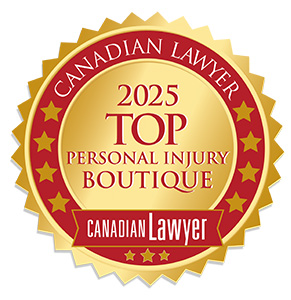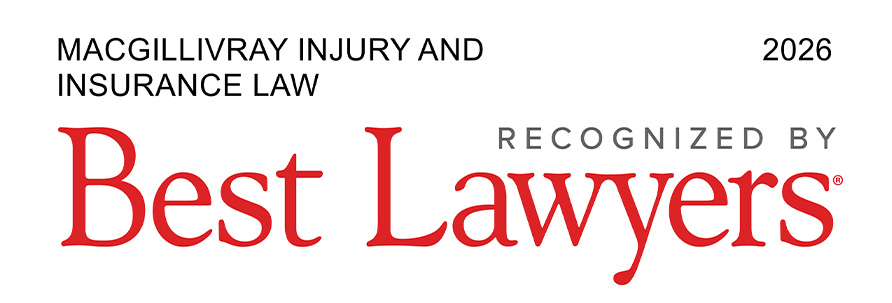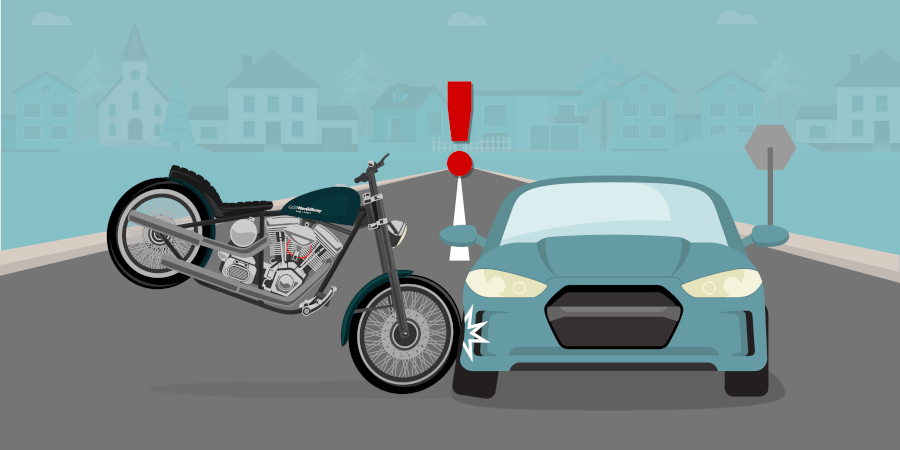




Suing after a motorcycle accident
Riding a motorcycle can be a fun and exhilarating activity. There are many beautiful places to visit in Nova Scotia and travelling by motorcycle is one of the many ways to take in our natural landscapes. However, motorcycle accidents can leave riders with devastating injuries.
For over 30 years, we’ve been helping people involved in motorcycle accidents receive fair compensation for their injuries. If you’ve been injured in a motorcycle accident and would like to learn your legal rights, contact an experienced motorcycle accident lawyer for a free consultation on your motorcycle injury claim.
What should I do after a motorcycle accident has occurred?
After a car accident in Nova Scotia, your first priority is safety. Once everyone is out of danger, take the following steps to protect your health, your rights, and any potential insurance claim:
- Ensure safety and call for help: Check yourself and others for injuries. Motorcycle accidents often result in serious harm, so call 911 immediately, even if you injuries don’t seem severe. If you’re able, move off the road to a safe area to avoid further danger. Turn on hazard lights if a vehicle is involved and it’s safe to do so. Stay calm and wait for emergency responders.
- Exchange information: Get the contact and insurance details of all other parties involved, including full names, phone numbers, driver’s license numbers, license plate numbers, Insurance providers and policy numbers. This information is essential for filing an insurance claim or potential legal action.
- Gather evidence: Take photos or videos of your motorcycle, other vehicles, the scene, and any visible injuries. Document the time, location, weather, and road conditions. If there were witnesses, collect their names and contact information. These details can help determine how the accident occurred and support your version of events.
- Report the accident to police: In Nova Scotia, you are legally required to report an accident to the police if anyone is injured or if property damage exceeds $2,000. Even in less severe cases, a police report offers an unbiased record that can help clarify fault and strengthen your claim.
- Notify your insurance company: Call your motorcycle insurance provider as soon as possible to report the accident. Provide only the basic facts of the incident. In Nova Scotia, you may qualify for Section B benefits, which can help cover: medical treatment, lost income and rehabilitation expenses. Timely reporting is often required by insurance policies and it ensures you can access benefits like vehicle repairs and medical coverage.
- Seek medical attention: Even if you feel okay, you should see a doctor. Injuries such as internal bleeding, soft tissue damage, or concussions may not be obvious right away. A medical exam can protects your health, and create a record of your injuries, which is vital for any insurance or legal claim.
Can you sue after a motorcycle accident?
Yes, in Nova Scotia you can make a claim against the driver who caused your injuries. First, you have to prove the other party is at fault and then provide evidence of your injuries.
Can a motorcycle driver sue even if they are partially at fault for the accident?
Yes, you can still sue the other driver if you were partially at fault for the accident. In some motorcycle accidents, the fault may lie both with the rider and the driver of another vehicle. Partial fault on behalf of the injured party is called contributory negligence. When a rider is partially at fault in a motorcycle accident, they will still be entitled to a portion of the damages. This amount will be equal to the percentage of fault the other driver has for the collision.
The Contributory Negligence Act, RSNS 1989, c 95, explains that where possible, a Court will determine the degree of fault apportioned to each driver based on the facts. In the rare occasion it is not possible for the Court to determine fault, they will split it evenly between the drivers.
For instance, if an accident between a motorcycle and truck occurred, and the truck driver was found to be 75% at fault, and the settlement was valued at $100,000, then the compensation awarded to the rider would be $75,000 for the truck driver’s negligence.
If you are accused of being totally or partially at fault for an accident, a personal injury lawyer can help in collecting the necessary facts to minimize the partial fault arguments and evaluate the claim to its full potential. Contact us for a free consultation.
When is another driver at fault for a motorcycle accident?
Another driver is at fault when their driving was substandard and that caused or contributed to the accident. The standard for driving in Nova Scotia is determined by referencing the rules in the Motor Vehicle Act, RSNS 1989, c 293, and past case law.
Examples of where another driver could be at fault are:
- Cars making left hand turns: Some drivers may not notice an oncoming motorcycle and proceed into their path of travel. (see Sections 101 and 114A of the Motor Vehicle Act).
- Distracted driving: Drivers engaging in activities such as texting, talking on the phone, or eating while driving can easily miss motorcycles on the road, leading to collisions.
- Speeding: Excessive speed reduces the time drivers have to react to motorcycles, increasing the likelihood of accidents. (see Section 93 of the Motor Vehicle Act).
- Failure to yield right of way: Drivers who fail to yield to motorcycles at intersections or when changing lanes are a significant cause of motorcycle accidents.
- Impaired driving: Alcohol, drugs, or other substances impair a driver’s judgment and reaction time, significantly increasing the risk of accidents involving motorcycles.
- Improper driving for road or weather conditions: Hazards like potholes, loose gravel, or debris on the road can be particularly dangerous for motorcyclists, especially when drivers take action to avoid hazards without regard for nearby motorcyclists.
- Inexperienced drivers: Motorcycles require specific skills and training to operate safely. Inexperienced riders may lack the necessary knowledge to navigate challenging situations.
What kind of injuries can someone in a motorcycle accident get compensation for?
A person injured in a motorcycle accident in Nova Scotia is entitled to compensation from the driver who was at fault for the accident. Common injuries for which motorcyclists get compensated include:
- Road rash
- Soft tissue injuries
- Serious fractures
- Spinal injuries and spinal cord injuries
- Damage to internal organs
- Burns
- Traumatic brain injuries and other head injuries
- Psychological trauma
Because of the lack of protection to the rider, motorcycle collisions can tragically not only result in catastrophic injuries, but often also result in fatalities. When a loved one has passed away in a fatal motorcycle accident, an experienced injury lawyer can help the deceased’s next of kin recover compensation from the negligent driver.
Are you entitled to no-fault Section B insurance when you are in a motorcycle accident?
Yes, in Nova Scotia, Section B no-fault benefits are mandatory and cover motorcycle accidents. Because motorcycles are considered motor vehicles under Nova Scotia law, no-fault accident benefits – often called Section B – apply to individuals with motorcycle injury claims in the same way as they apply to those with traditional motor vehicle claims.
No-fault accident benefits are called ‘no fault’ because they apply to anyone with motor vehicle insurance, no matter which driver’s negligence caused the accident. This is also the case for motorcycle accident claims – motorcycle riders involved in collisions are eligible for Section B benefits under their motor vehicle insurance policy. Section B expenses can potentially cover medical costs, lost wages, and other expenses related to your accident.
For a more comprehensive explanation of Section B benefits, please see our Section B Benefits section.
If you are in a motorcycle accident, how can you prove you are not at fault?
You can show you did your part to prevent or minimize the effects of the motorcycle accident by:
- Showing photos of the protective gear you wore, including a helmet with eye protection
- Demonstrating your conduct of regular safety in performance checks before riding
- Practicing maneuvering skills in a private lot
- Explaining awareness of the “invisible motorcycle” phenomenon (perceptual blindness to motorcycles)
- Staying out of other drivers’ blind spots
- Avoiding lane splitting
- Staying alert
- Giving yourself time and space to react to dangerous situations on the road
Taking the steps above can prevent a motorcycle crash and eliminate the need for a personal injury lawyer altogether. However, if a motorcycle accident occurs, the injury lawyers at MacGillivray Law are ready to take on your legal claim and protect your interests.
Matthew’s story
Are there Nova Scotia court cases about motorcycle accident injuries?
Yes, there are published court decisions in Nova Scotia where motorcyclists received compensation through the Courts. Keep in mind that each case is unique, and no two situations will be identical. If you’ve been injured in a motorcycle accident, it’s important to get input from a lawyer. With the help of an experienced lawyer, most injury claims settle before they reach court.
Blenus v. Fraser, [2021] NSJ No 97, 2021 NSSC 79
Mr. Blenus was riding his motorcycle on Bennett’s Bay Road near Canning, Nova Scotia, when an oncoming vehicle made a left turn in front of him, causing a collision. Mr. Blenus was thrown from his motorbike on impact, causing serious injuries, including a broken scapula and clavicle, several rib fractures, a collapsed lung, and soft tissue injuries. He later developed chronic pain due to his injuries. The Court awarded $100,000 in general damages, $25,000 for loss of housekeeping and valuable services, and $25,000 for costs of future care. However, the Court also found that the Mr. Blenus had not mitigated his damages, since he did not attend any regular rehabilitative treatment, did not seek appropriate medical attention after a subsequent fall, and was not cooperative with his treating physicians. The Court accordingly reduced his damages by 25%.
Tibbetts v. Murphy, 2015 NSSC 280
Ms. Tibbetts was riding her motorcycle with friends on a gravel road. In attempting to avoid hitting another member of Ms. Tibbets’ party, the Defendant’s truck collided with the Ms. Tibbett’s motorcycle. She suffered a fracture to her left tibia, a fracture to her left fibula, and a dislocated and fractured left hip. Her functional abilities were severely limited for many months following the accident.
The Court found that Ms. Tibbetts was contributorily negligent because she could have seen and avoided the Defendant’s vehicle if she had been paying more attention. Accordingly, the Court apportioned liability two-thirds to Ms. Tibbetts and one-third to the Defendant. The Court also found that Ms. Tibbetts failed to mitigate her damages by declining some available treatment which could reasonably have improved her recovery. The Court assessed general damages at $30,000, resulting in an actual award of $20,000 after the reductions for shared liability.
Common questions about motorcycle accident injuries
Motorcycles are motor vehicles under Nova Scotia law, and because of that, they are treated by the legal system the same as a car, truck, or any other motor vehicle on the road.
Visit our Motor Vehicle Accidents section for answers to common questions that apply to all motor vehicles, such as:
- What is the deadline on filing a motorcycle accident lawsuit?
- How much is my injury claim worth?
- What if the other driver is uninsured or unidentified?
- Should I accept the settlement my insurance company offers me?
- Do I have to make a statement to my insurance company?
- How long does a personal injury claim take to resolve?
Motorcycle riders are required to have an insurance policy on their vehicle, just like drivers of other on-road vehicles. When an insurance company denies a motorcycle accident claim, or liability for the accident is in question, a personal injury lawyer can help you get the compensation you deserve.
Do I need a personal injury lawyer for my motorcycle accident in Nova Scotia?
Motorcycle riders often suffer more severe injuries and face more legal challenges than drivers involved in car accidents. That’s why working with an experienced motorcycle accident lawyer in Nova Scotia is so important. When your legal team begins handling your case, they will collect all essential documents to build a strong injury claim on your behalf. This includes your medical records, police report, and any witness statements.
Your lawyer will also take over communication with the at-fault driver’s insurance company, as well as manage most interactions with your own insurer. This helps reduce your stress and ensures that your rights are fully protected throughout the process. While you focus on your recovery, your legal team will fight for a fair settlement and make sure you have every possible advantage to receive the full compensation you deserve.
Don’t navigate the legal process alone! Contact our motorcycle accident lawyers today for a free consultation and get the support you need to move forward with confidence.
Relevant legislation
Motor Vehicle Act, RSNS 1989, c 293.
Contributory Negligence Act, RSNS 1989, c 95.
Have questions for our team?
Frequently Asked Questions
What Our Clients Say...
Request a
Free Consultation
If you would like to learn your legal options at no obligation, contact us today to set up a free consultation.



